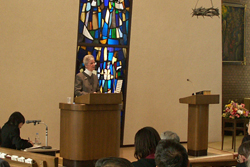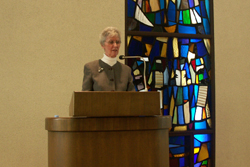Center for Interdisciplinary Study of Monotheistic Religions(CISMOR)Doshisha University
> Public Lectures > How Living in Japan Enriches my Understanding of Monotheistic ReligionsPublic Lectures
Lecture (Open for the public)
How Living in Japan Enriches my Understanding of Monotheistic Religions
| Date: |
2005/03/05 |
|---|---|
| Place: | Chapel in the Divinity Hall, Imadegawa Campus, Doshisha Univ. |
| Lecture: | Prof. Barbara B. Zikmund(Doshisha Univ.) |
|
Dr. Zikmund considers monotheism to be an important way looking at the world, and she began her lecture with the introduction of four important aspects of monotheism. First, monotheistic views of Creation have urged religious diversity; second, monotheistic views about human nature influence social values and change; third, monotheistic religions empower women for public responsibility; and fourth, they move beyond religious tolerance toward the promotion of religious pluralism. Dr. Zikmund’s life in Japan causes her to reconfirm the importance of these aspects. 1) The three monotheistic religions share a common story of beginnings, which tells about the diversity of God’s creation. For example, in the story of the tower of Babel, God prevented a unified humanity from completing the project of building the tower by confusing their language, so that the people divided into many races. This story tells of the importance of accepting human diversity. Generally, monotheism tends to be understood as focusing on 'unity.' However, actually such emphasis on the acceptance of diversity is confirmed by the monotheistic canons. 2) Confucian thought, which has such a strong influence in Asian societies, has a very positive view of human nature. However, it has also led to burdening humans with a high standard of conduct. In contrast, monotheism has more realistic views about human weakness and human evil. It is based on awareness of human finitude. Therefore, the monotheistic world builds society on the assumption of human evil. Dr. Zikmund thinks such views about human nature are more sound than those Asian views grounded in Confucianism. 3) When one researches the history of women in American society, monotheistic religious ideas and movements have had a great influence on the public roles of women. For example, the Christian reformers’ principle of sola scriptura is a remote cause of the improvement in the social status of women in the West today. On the other hand, under the influence of Confucianism, in Japanese society women’s social roles are still often evaluated negatively. Before living in Japan, Dr. Zikmund thought that Judaism, Islam, and Christianity oppress women. Now, from her experiences of Japanese life, she has recognized that women’s social roles are also guaranteed in these religions. 4) In the early days of American religious history, people did not accept religious pluralism. But in America, where from the beginning various denominations have coexisted, religious diversity was accepted reluctantly in order for each denomination to maintain its own rights and thus to survive. That is, the tolerance of a religiously diverse society did not necessarily lead to the appreciation of a situation of religious pluralism. However, over the course of time such a situation produced the religious pluralism of today, which sets much value on the religiously diverse situation itself. After confirming the aforementioned aspects, Dr. Zikmund expressed her views about the culture and religiosity of Japan, as follows. Usually, it is explained that Japanese religion is polytheistic, but she thinks that Japanese religion is not any kind of theism. Paul Tillich based the foundation of religiosity on 'ultimate concern,' yet this is not visible in Japanese religion; rather, it is superficial and sometimes seems to be a kind of recreation. Living in Japan, basically a non-religious society, Dr. Zikmund has reconfirmed diverse meanings of being a monotheist. However, through that aspect of Japanese culture which places much emphasis on non-linguistic-communication, she was reminded that it is impossible to express God through human language. Finally, she mentioned that Japanese people often make the mistake of understanding monotheism based on claims sometimes made about the exclusivity of its own truth, but in America today such a perspective is a minority view. The perspective of most American monotheists is that their religious belief is a matter of their own choice, and they know that they do not accept it on the basis of its absolute truth with respect to others. Monotheists believe in only one God. And yet the way to the one God is not singular but plural, and the way God saves humanity is also plural. After the lecture, various questions were taken from the floor. There were about 100 visitors. Tai Takata (CISMOR Research Assistant, Graduate Student, School of Theology, Doshisha University) |
|
|
Handout |
|

